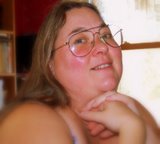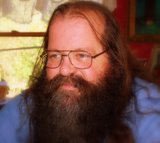by Misti Anslin Delaney
We are approaching the tenth anniversary of my father's death. it seems like a good time to revisit an article I wrote back then about coping with loss -- and with love across a cultural chasm.
The death of a loved one is always devastating, no matter how prepared we think we are. It's made even more difficult when death comes suddenly to wreck havoc with a love was carefully built and nurtured across the chasm of cultural differences.
That was the case between my father and me. Dad was very conservative; a devout Roman Catholic with a very old world view of women and our place in the world. I was quite liberal back then and, of course, I am a witch. I have a very different view than my father's of the place of women in the world. This caused untold trouble and tension between us throughout my childhood and young womanhood.
As we both grew older and more tolerant, we realized that each of us wanted a better, closer relationship: I with the only father I'll ever have, and he with his only daughter. So, slowly and carefully, we built a suspension bridge of tolerance and love, shared views on those few areas on which we could agree and our shared devotion to family, across the chasm between our worlds. Periodically we would crawl tentatively out onto that bridge to meet in the middle, clinging precariously to what security we could find there.
We had both come to trust that bridge in the decade since our first tentative attempts to build it, and so it was that, during my Dad's last weeks, we met there almost daily in long telephone conversations about everything and, mostly, nothing. It was there that he said "goodbye" before he died. It was subtle, and I'm not sure he knew he was leaving ... but things were different somehow. My father, who had visited me only twice in the 22 years since I left home, when he happened to be in the neighborhood, and who had not attended either of my weddings, suddenly started to make plans to come to my home to put air conditioners in my windows. (Not something I had planned to do.)
When, within a week of making those plans, he became too ill to travel, he sent me the first and only "surprise gift for no special reason" that he ever sent to me. It was small -- a bag of mesquite chips for our barbecues, because I had mentioned that they're a bit expensive up here -- but it was a gift specifically for me from my Dad.
The day after I received them, I received word that he had died.
I think the hardest part of my father's death was venturing out onto that precarious bridge alone, to cross back over into his world one last time for his funeral. I found myself very much alone in my father's world—welcome, but a stranger with strange views. I was surrounded by family and friends remarkable in their devotion to one another and to their God.
Although my mother and brothers know about my beliefs, everyone else I met there assumed that I shared my family's devotion to my father's faith. Since I didn't think religious arguments were going to help anyone through that difficult time, I elected to keep my own counsel for the nine days I was there.
Psychologists say that when a parent dies, we have a tendency to question everything about our lives. When our lives are a secret to the people we've grown up with, I think it redoubles the effect. My first challenge was figuring out what one does when one is a very visible participant in a religious ceremony where everyone assumes we share the faith, but we don't.
It seemed to me that even if my 25 years away hadn't removed any possibility of pretending I was a Catholic, to pretend now would serve only to make a farce of my family's faith. But to act like a complete alien to my mother's faith would be disrespectful and would hurt her deeply. So, I compromised. I sat, stood, and kneeled as the ceremony required and kept my head respectfully bent, but I was silent during the prayers.
I thought I was doing OK -- until the priest, who had no doubt counseled my parents about how to cope with their only daughter's falling away from the faith, make several cutting remarks about "faithless, hopeless pagans". The first time, I couldn't believe what I'd heard. The second he looked right at me as he made his remark.
How very little that man knows about paganism.
Through the time I was with them, my immediate family was very, very welcoming and loving. Believe it or not, that caused my second dilemma. I had tried for many years to believe as they do and all my life I had felt like an outsider in my own birth family. I know the pain my "falling away" caused both my parents.
After a few days of the loving and welcoming, and the constant salvation talk, I found myself wondering, if I tried again now, whether I might be able to "believe" this time. Not for myself, but for my mother and father. My return to their church would have made my father so happy, and it would still bring my mother and brothers great joy.
Cut off, as I was at this vulnerable time, from anyone who really understood what I believe and who shares my faith in the cycle of life and my joy in the beauty of our magickal world, it began to seem "silly" and unreal.
Prevented from sharing my real understanding of what had happened between my father and myself in those last weeks and my certainty that he would be back, perhaps in the baby who was to be born to my brother and his wife just 5 weeks after Dad's death, I began to question everything. It was very painful. I knew I didn't (and probably couldn't) believe as they do. I knew that religion isn't something you choose, like a party dress, to please someone else. But I also couldn't feel my own faith. I felt that all faith had been cut away from me, and that my soul was raw and bleeding.
Fortunately, I am a voracious reader on almost any topic, and I knew the effects of mourning could have on one's soul, so I was able to observe these feelings with a little objectivity. I resisted the urge to act on anything until I was home, in my own world.
When I left for home, my mother sent with me a huge basket of flowers that had been sent for my father's funeral. As I carried that glorious basket through airports, people would stop me to comment on them and ask about them. It gave me a chance to explain to complete strangers that my father was dead. Everyone I met that way was extremely kind and the flight attendants were attentive and caring on every flight. That was very comforting. This time, as I crossed that bridge my father and I had built together for the last time, I didn't feel so alone.
When I was finally home, I was still haunted by my feeling of having had all faith cut away from me. For weeks I wasn't able to perform ritual, either for my father, or for myself, because I felt him always nearby, and I worried that he would be hurt and perhaps insulted to have his beliefs disregarded by my doing ritual for him.
It made no logical sense. Since he'd passed through the curtain, he now knows better than any of us alive, what Truth is. His soul is unlikely to be as encumbered by prejudice as those of us who must understand with our frail, limited human brains. But the feeling persisted; the effect, no doubt, of my own childish guilt at wanting to do something that Daddy wouldn't approve of.
I reached out to all the wisest pagans I know, to ask for thoughts and affirmation. Many shared with me thoughts that brought me great comfort, and one especially wise soul shared with me a ritual that could respect both my father's beliefs and my own.
Gradually, as the moon waxed, I too, grew stronger. As the full moon approached, I gathered the supplies I needed for what I had to do. On the day after the full moon, I set up a memorial to my father on my altar. A photograph of the man he was; a white pillar candle that burned as long as anyone is in the house and awake; a beautiful little glass box containing a few of the mesquite chips that were his last gift to me; and the basket of now dried flowers from his funeral.
Each time I lit the candle, I told my father that I love him, and will miss him, but that it's now time to move on. I send him the energy of the burning candle to find his way into his next world, whether it be the heaven he so looked forward to, or a new life on the wheel.
On the next full moon, I did a ritual alone, commending my father's soul to his God, and asking my gods for support in learning to live without my father in the middle of that bridge we've built from the tears and yearnings of two very different souls who wanted to love and understand.
In the intervening ten years, I have learned to live with my Dad, and I have found that the bridge is still there and it continues to grow stronger. When I need Dad's advice, I can still journey out there, and he's there, waiting.
Thanks, Dad. I love you.





2 comments:
That is still a great piece of writing!!
Thanks, Honey. <3
Post a Comment